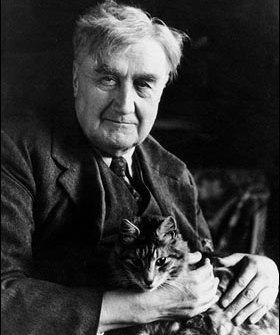
Ralph Vaughan Williams
The English composer Vaughan Williams (1872-1958) composed in practically every genre during his long and fruitful lifetime. He wrote nine symphonies; five operas; film, ballet and theatre scores; orchestral and choral works; and song cycles. He studied at Charterhouse School and Trinity College Cambridge, then in Berlin under Max Bruch, and in Paris under Maurice Ravel. He was drawn to the language of English folk songs and choral tradition; he joined the English Folk Dance and Song Society, and from the start of the 20th century he began industriously collecting old songs, mostly from the Tudor period. As such, he became one of his country’s most enthusiastic ethnomusicologists, collectors and adaptors. Between 1896 and 1899 he was the organist at the South Lambeth Chapel in London; in 1919 he became a teacher of composition at the Royal College of Music. He had a long and deep friendship with Gustav Holst, and was deeply shocked when he heard that another colleague, George Butterworth, had been killed in action during World War I. His unique, romantically illustrative, colourful, free, novel and polyphonic musical language was mainly inspired by English folk music and the influence of the 16th and 17th century English masters. His music radiates with the homely ambiance of the English countryside. But his deep-rooted Englishness is what gives universal value to his art. He wrote many works rich in natural poetry, including The Lark Ascending and In the fen country. One of his most famous works is the olde-worldy Fantasy on a Theme of Thomas Tallis, written for orchestra.